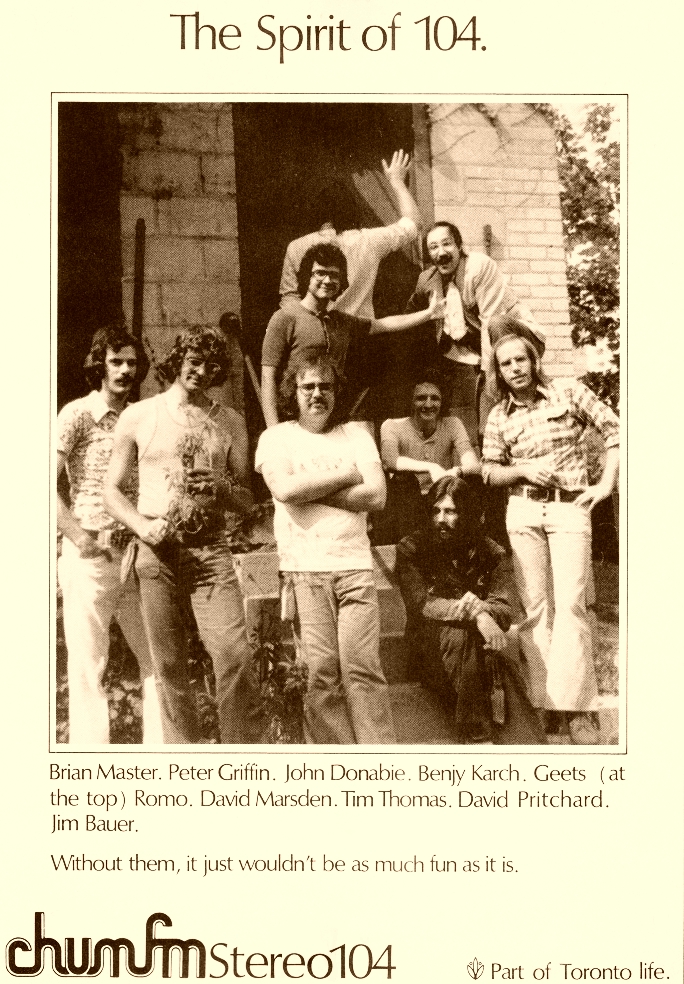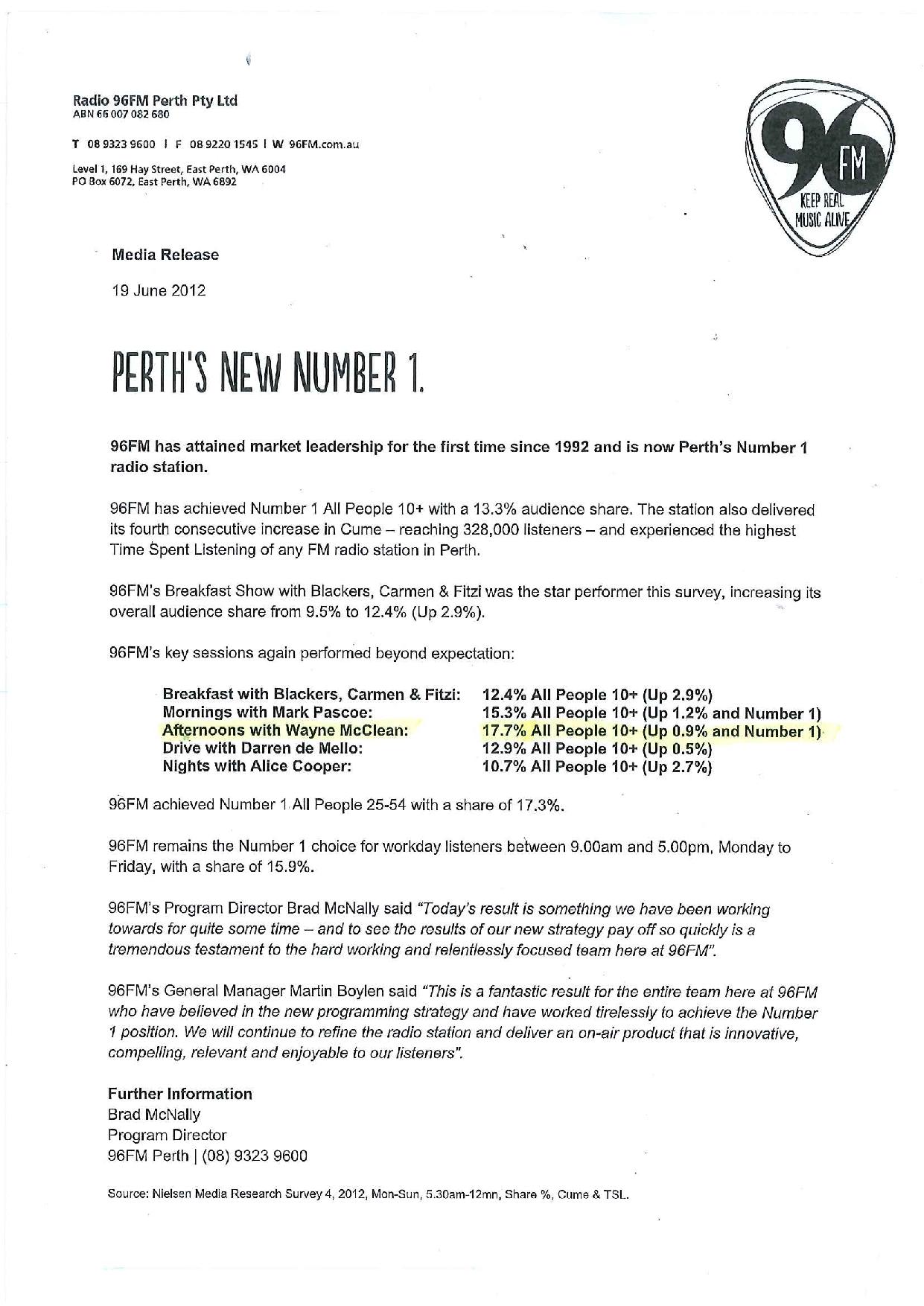Brad McNally – the Exit Interview
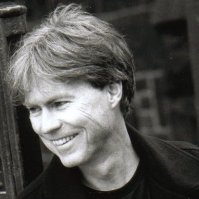
Following his recent retirement from radio for health reasons, Dave Charles spoke to commercial radio veteran Brad McNally. Dave picks up the story:
Dave Charles: Brad McNally is retiring from radio. Brad, as most of you may know, had a brain tumour removed and has decided to retire from his active radio work to focus on his health.
Brad is now based in Perth with his wife Marg and their famous cat, Louie.
Brad, tell us about your teenage years. What kind of teenager were you?
Brad McNally: I was a typical Canadian hockey kid, with a rink in the back yard in winter. I remember listening to the radio all the time. Stations like CHUM and the stations that beamed in from Buffalo and northern NY state. As soon as I was old enough I was on the bus to Toronto to go to the huge record store Sam the Record Man, and I would hang out in there looking at everything, and then usually buy an album with my allowance.
DC: When did you realise that radio was going to be a major part of your life?
BM: I saw a few stations doing OBs in shopping centers, which was interesting, but I really wanted to know more about the music side of things. How they chose the songs and so on.
I asked one of the DJs in the Mall, ‘How do you choose what records to play.’ and he said, ‘Oh, the boss does that.’ So I said then and there, ‘that’s the job I want.’
He just said, ‘get out of here, kid.’ I guess I was being a pain in the ass, but I was only 12.
DC: Tell us about your early days in radio in Canada?
BM: I returned to Canada in 1978, and lived in Toronto. I listened to the big stations in town – CHFI, CHUM FM and Q107. At first I wanted to work at Q107. All my friends listened to Q107. Dave, I called you up and you invited me in. My recollection was that you were very good on the air.
You suggested that I apply to some stations outside of the Toronto area, and I ended up at CFTJ in the town of Guelph.
I think I lasted at this station about a month. I made some good friends there, but the programmer, in my view, was a lightweight, so I quit and ended up in Orillia at CFOR. I did the afternoon show and this time the manager came from the mighty CKOC, a great station in Hamilton, Ontario.
Orillia was a great place to live and was the home of the famous Canadian poet Stephen Leacock. The manager, whose name escapes me right now, discussed with me how a top 40 station rotates the songs and why. I began soaking this all up.
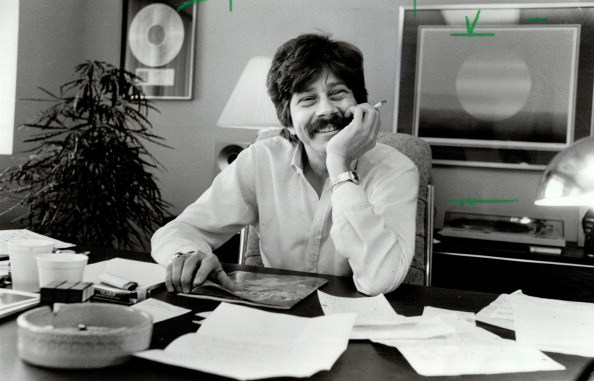 On one of my drives back to Toronto, I heard CFNY, The Spirit of Radio, and I knew this was the station for me.
On one of my drives back to Toronto, I heard CFNY, The Spirit of Radio, and I knew this was the station for me.
Listening closely, I could not hear any of the rotation patterns I learnt from CFOR, and I heard the announcers pretty much doing what they wanted on the air. This was the 70s and free-form FM.
I called the PD David Marsden many times and sent him examples of my work. But he never got back to me. Then one day he did and I was invited in. The station was in a little converted yellow house in Brampton, and was tiny. The studios were in the bedrooms and the library was in the closet behind the announcer.
David offered me the 9 to noon slot and I was over the moon. There wasn’t a format as such and I could play whatever I wanted from these categories: New… Oldies… Blues… Jazz… I am all for self-expression through art, but even I knew this was a tad self-indulgent, yet fun.
Each music sweep seemed to be built on a theme. You could hear songs about summer and songs that came from the Punk Generation. and you could start out with The Rolling Stones and end up with Frank Zappa. So all my years of hanging around record stores was paying off! My love of poetry helped with the bits in-between and I even got some published in 1978 in a Toronto magazine.
DC: What are some of the classic mistakes you made along the way? And what did you learn from those mistakes?
BM: See the story of ROCK 104 Dublin below.
DC: You lived and worked in Sweden for a number of years. What adjustments did you have to make to your personal and professional life?
BM: Yes, what an honour to live and work in a foreign country and experience it like a local. A thing I heard all the time in radio was, ‘That will never work here. It’s different here.’ This is true to some extent, so it was an opportunity to practise the art of patience.
Obviously living in a country where English isn’t the first language has its challenges. But every Swede learns English from age 9, so I wasn’t forced to speak Swedish, which in some ways was a real pity.
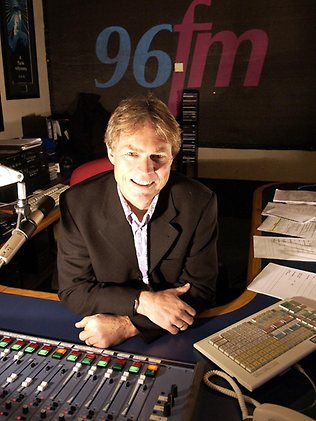 DC: You have many career highlights. Is there a stand-out moment that you’d like to share?
DC: You have many career highlights. Is there a stand-out moment that you’d like to share?
BM: At 96FM Perth, when they went number 1 in the 80s and getting it back to number 1 in the 2000s against Mix, after a ‘Keeping Real Music Alive’ rebrand were very exciting times.
DC: What are the two most important books that have affected the way you think?
BM: Probably the Ries and Trout books on Positioning and Marketing and another called Mental Toughness by J. Barnes.
DC: You’re a black belt Brad. How has martial arts helped you in your radio life?
BM: Great question. My dad first enrolled me in a class in Oakville when I was about 11. I was terrified at the time. It’s very intimidating when you first walk in a class, as there is often lots of yelling and grunting and to a little kid that’s daunting.
Over time I tried different style, including the hard Japanese Kyokushin style. Then as I got older I focused on Yaw Hawk Tao, a softer style (Chinese). The key is always to find the right teacher. People think that martial arts is all about how to punch and kick, but thanks to my great Sifu, for me I learned more about life skills than anything else: integrity, respect, honour.
A martial artist is taught to see, feel and listen internally. You also learn how to find focus and stillness. But for most people it’s about self-esteem and confidence. I was at my fittest when I was training three times a week … and running.
DC: You’re a marathon runner. How has your running helped you overall?
BM: My doctor recently told me that it was my fitness level and running that helped me get through my brain operation – my biggest marathon yet! I have a very low resting heart rate. Running is my meditation and focus.
I have had powerful insights while running and have written some of the best promos in my head on those 5 am runs. It was on my runs during the ‘Keeping Real Music Alive’ campaign that I wrote a series of promos I called ‘ The Instrument Series’ (one is attached for your listening pleasure).
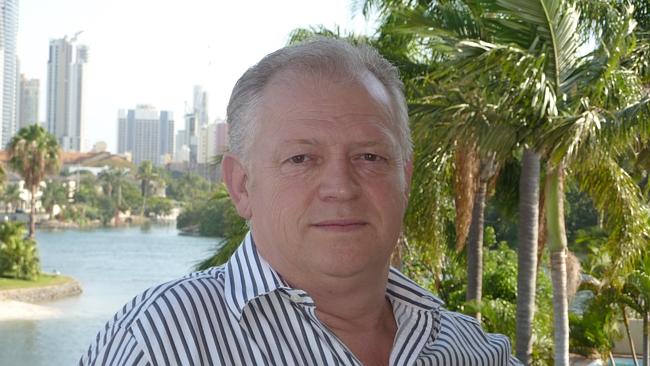 DC: What were some of the best radio stations that you listened to in Australia over the years?
DC: What were some of the best radio stations that you listened to in Australia over the years?
BM: I think Triple M Melbourne is a great station with a great breakfast show. Mix Perth is also a great station.
Hot Tomato is a great station – both on the air and inside the building. It has a great team and culture. It’s a stand-alone station and I cannot say enough great things about how the station is run by owner Hans Torv and the GM, Graham Miles.
DC: You’ve worked in Canada, Sweden, Finland, Ireland and Australia. Tell us a great story from your radio travels that is the most memorable?
BM: I remember that the manager of Radio City Helsinki, a classic rocker, told us he bought some empty Russian missiles and wanted to put them around town with the station’s logo on them. We said no.
Another time when I was listening, I heard a sweeper in English, with a sexy female voice that said: ‘I’m freshly showered, freshly fucked and ready to rock’. I almost had a heart attack when I heard this. But they told me that ‘fuck’ was just a movie word in Finland and it didn’t mean anything to them. Hmmmm. Practise patience, I reminded myself.
DC: Your passion is music. What is the essence of a great music station?
BM: That there be a centre for the format and that you know what the station stands for within 30 minutes of listening to it.
DC: Who are your mentors in radio? What did you learn from them that you still practise today?
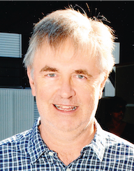 BM: I would have to say David Marsden, my PD at CFNY in Toronto, who taught me not to be afraid to take chances and to always push the creative envelope.
BM: I would have to say David Marsden, my PD at CFNY in Toronto, who taught me not to be afraid to take chances and to always push the creative envelope.
Greg Smith, who taught me about strategy and tactics, and to be analytical.
Peter Benson OAM (my Managing Director in Sweden), who taught me all about the bottom line.
DC: What is the first thing you do when you start work for a new station that is out of focus and losing in the ratings?
BM: I look at Selector and the music universe. If I see 6,000 songs, I ask why so many? When the reply is invariably that we need that many for variety, I break out into a cold sweat.
DC: What is the craziest radio promotion that you were involved with? Give us the highlights?
BM: A tough one. probably Save the Spirit of Radio, which was really CFNY’s David Marsden’s thing. In the late 70s, the CRTC (Canada’s equivalent of ACMA) considered taking the station’s license away and changing the music format. The listeners went crazy. There were petitions. Canadian band Rush wrote a song about it at the time, The Spirit of Radio.
I also co-wrote a song Working On the Radio and we pressed 3,000 copies and sold out within weeks. I even got a royalty cheque for $32!
DC: You’re well known for your many successful radio battles in Australia. What was your greatest win and how did you achieve that success?
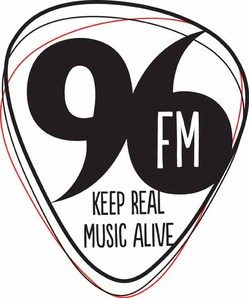 BM: With 96fm, the station’s image was so bad. We considered blowing it up and renaming it or rebranding the station. I had the trust of the local manager and the CEO, Graham Mott.
BM: With 96fm, the station’s image was so bad. We considered blowing it up and renaming it or rebranding the station. I had the trust of the local manager and the CEO, Graham Mott.
They said to me, ‘Brad, do what you have to do, just keep us in the loop.’ Fair enough, as I am always happy to be held accountable. So I told them if I stuff it up, you can shoot me. They said, ‘You have a deal.’
Step one was to hire the best agency in Perth and the best creative director. We decided on Meerkats and Gavin Bain.
We researched the market with a series of focus groups (driven by Meerkats) plus our own internal research, driven by Ben Roberts.
We found that Perth listeners had a soft spot for the station (many had grown up with it). They told us that 96 had lost its way and they wanted it to get back to where it was. It was vital that the radio station didn’t live in the past. It needed to move forward and remain relevant.
We looked at the strengths and weaknesses of 96 and its competitors.
We built a total image for the new 96. Its heritage is that it was a groundbreaking station in the 80s (led by Gary Roberts), and while it could not live in the past it could still be an authentic music station.
We got the station to number 1 within three rating books in 2012.
The 96fm brand had a complete overhaul.
 When Adam Lang became CEO he also did internal staff research and found that the culture was not in great shape. So he was on the path to slowly rebuild the culture and make 96 a good place to work again. In time people slowly changed and looked forward to coming to the station each day.
When Adam Lang became CEO he also did internal staff research and found that the culture was not in great shape. So he was on the path to slowly rebuild the culture and make 96 a good place to work again. In time people slowly changed and looked forward to coming to the station each day.
Adam wanted the staff to be aligned and engaged and for them to know how their position contributed to the overall station’s mission.
Up until this point the staff had never thought about their jobs in this way. It seemed to me that Adam understood the difference between management and leadership. Leadership is vision and people buying into it and management is about processes.
Here’s a summary of how we approached the 96 rebrand:
- Fix the station’s position
- Get the best agency in town
- Do the research
- Build a unique music position that cannot be copied by the competitor
- Ask:
– What is the brand legacy?
– What are the business objectives?
– What are the ratings ad target objectives?
– What are the timelines?
DC: Who were/are some of the greatest Australian on-air talents that you respected and looked up to? What was the single most important quality that they possessed?
BM: Tony Hartney: great turn of phrase, concise, always engaging. Sean Flanagan at Hot Tomato breakfast: a very skilled writer and storyteller. He plans, writes and rewrites all the time and it’s no wonder he is a part of the number 1 breakfast show on the GC today.
Luke Bradman: He’s polarising but highly intelligent, knows what the audience wants and is another good storyteller.
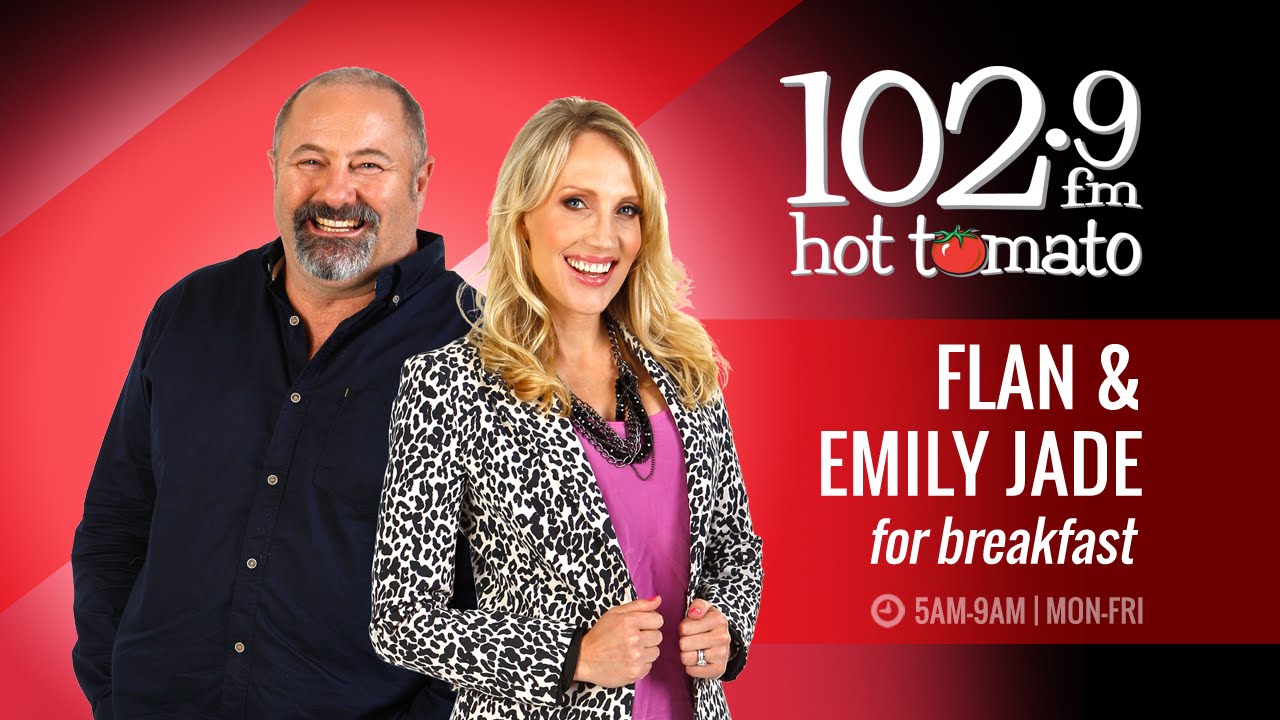 DC: What are some of the key qualities that you look for in a new radio talent?
DC: What are some of the key qualities that you look for in a new radio talent?
BM: A passion for radio, a keen listener, and a close observer of pop culture.
DC: New media, podcasts are gaining in popularity. What should radio programmers know about new media content?
BM: Start listening, there is great content out there.
DC: Who are the new radio Ninjas? What impresses you about them?
BM: Luke Toohey is a good guy, also a (real) ninja who never gives up. Paul Browny at Triple M, another guy who loves radio and won’t stop… he’s a driver. Doug Terry, the afternoon guy at 96, who I had my eye on for a while, is a good guy and an engaging jock who nails it every time. He loves heavy metal, but we won’t hold that against him.
Ugly Phil is another ninja talent who is not to be underestimated.
DC: What are some of the most valuable lessons you’ve learned as a major market PD?
BM: Treat people like you want to be treated. There’s no need to be a hard ass … that is so 1980s. Be a good listener. For me, honesty is a core value and relationships are built on trust.
DC: What would you tell a young person who is interested in radio or new media as a career path?
BM: It’s a great industry, work out what you want to do and stay on track and never give up.
DC: Any regrets in your international radio career?
BM: Yes, ROCK 104 in Dublin. Didn’t get it right. I should have paid more attention to the locals who said rock means leather jackets here and heavy metal. I thought we could redefine it. BIG mistake.
Once listeners have made their minds up, that’s it. The first rule of positioning is: ‘Truth is irrelevant. What matters is what perception exists in the mind.’ (Ries and Trout).
DC: Final question. Tell us about your amazing cat, Louie?
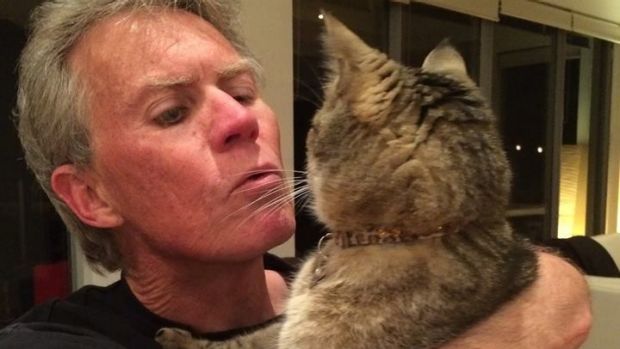 BM: Ah, Louie. He is a rescue cat. A year after we adopted him he got hit by a car and lost a back leg. His sister got hit the following week and died. Louie is a tough cat.
BM: Ah, Louie. He is a rescue cat. A year after we adopted him he got hit by a car and lost a back leg. His sister got hit the following week and died. Louie is a tough cat.
When he was hit he dragged himself off the road around to the back of our house to his favourite spot, where I found him in a pool of blood and rushed him to the vet. He has his own Facebook page. You should read it…
DC: Brad, you’ve contributed so much to the global radio community in your career so far. I want to say on behalf of the radio and music industry THANK YOU for making great radio over many years. We looking forward to hearing your news and views in the future.
Brad’s email is [email protected]
Dave Charles can be contacted at his website www.mediaresults.ca
